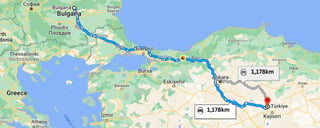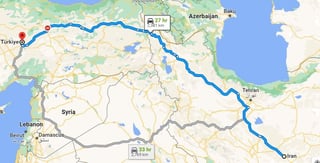Crossing the Border: A Comprehensive Guide to Entering Turkey via Land Borders

If you're planning to enter Turkey via land, it's important to understand the different road border crossings that are available. Turkey has a number of border crossings with neighbouring countries such as Greece, Bulgaria, Georgia, and Iran. These crossings are open to both pedestrian and vehicular traffic, making them accessible to travellers with different preferences and needs.
It's worth noting that the process of entering Turkey via a land border crossing can be quite different from entering via air travel. When you arrive at a land outpost, you will be expected to present your passport or another form of ID for inspection. Depending on your country of origin, you may also need to obtain a visa or an electronic travel authorization in advance.
Additionally, you should be prepared for longer wait times at land border crossings, especially during peak travel periods. It's a good idea to arrive early and bring plenty of snacks and water, as well as any necessary medications or other essentials.
In summary, entering Turkey via its land borders can be a great option for many travelers. With a little research and preparation, you can enjoy a smooth and hassle-free entry into this beautiful country.
Required Documents for Entering Turkey through a Land Border Control Post

Entering Turkey by land is comparable to arriving by other means, such as by water or through one of the country's major international airports. At any of the numerous land border crossing checkpoints, visitors are required to present the necessary identification documents, you will need to have the following documents:
- Passport: You will need a valid passport to enter Turkey. Make sure your passport is valid for at least 6 months beyond your arrival date in Turkey.
- Visa or e-Visa: Depending on your country of origin, you may need a visa to enter Turkey. You can apply for an e-Visa online before your trip, or obtain a visa at the border. Make sure you check the visa requirements for your country before you travel.
- Printed or electronic copy of your return ticket: Border control officers may ask to see evidence of your return ticket to ensure that you plan to leave Turkey within the allowed time frame.
It's important to note that border control officers may ask for additional documentation depending on your circumstances. Make sure you have all the necessary documents before you travel to ensure a smooth entry into Turkey.
Tourists arriving in their own vehicles will need to provide additional documents to ensure proper importation and authorization to operate on Turkish roads. The following items are required:
- Vehicle registration document: This document shows proof of ownership of the vehicle and includes details such as the make, model, year, and license plate number.
- Insurance documents: Tourists will need to provide proof of valid vehicle insurance that covers driving in Turkey.
- International driving permit: Depending on your country of origin, you may need an international driving permit to legally operate a vehicle in Turkey.
- Customs declaration: Tourists may be required to declare any goods they are bringing into the country and pay any applicable duties.
It's important to note that the specific requirements may vary depending on the type of vehicle, country of origin, and other factors. It's recommended that you check with the Turkish embassy or consulate in your home country for the most up-to-date information.
How to Enter Turkey from Greece via Land?

To enter Turkey from Greece via land, you have a few options:
- Pazarkule-Kastanies Border Crossing: This is the most popular border crossing between Greece and Turkey. The border crossing is located in the northwestern part of Turkey and the northeastern part of Greece. From the Greek side, you will need to take the Egnatia Odos highway to the border crossing. On the Turkish side, you will need to take the D550 highway. Both sides have customs and immigration checkpoints, where you will need to present the necessary documents.
- Ipsala-Pythio Border Crossing: This border crossing is located in the western part of Turkey and the northeastern part of Greece. To reach the border crossing from the Greek side, you will need to take the Egnatia Odos highway. On the Turkish side, you will need to take the D110 highway. Both sides have customs and immigration checkpoints.
- Other Border Crossings: There are a few other smaller border crossings between Greece and Turkey, but they may have limited hours of operation and fewer services. It's recommended that you check with the Turkish embassy or consulate in your home country for the most up-to-date information.
Make sure you have all the necessary documents, including a valid passport, visa or e-visa (if required), vehicle registration documents (if driving).
How to Enter Turkey from Bulgaria via Land?

There are several border crossings between Bulgaria and Turkey that you can use to enter Turkey from Bulgaria via land. Here are some of the main ones:
- Kapitan Andreevo - Kapikule: This is the busiest border crossing between Bulgaria and Turkey, located near the city of Svilengrad. It is open 24 hours and serves both pedestrians and vehicles.
- Lesovo - Hamzabeyli: This border crossing is located in the eastern part of Bulgaria and is the second busiest crossing between Bulgaria and Turkey. It is open 24 hours and serves both pedestrians and vehicles.
- Trnovo – Aziziye Malko: This border crossing is located in the southern part of Bulgaria, close to the Black Sea coast. It is open from 8 am to 8 pm and serves both pedestrians and vehicles.
To enter Turkey from Bulgaria via land, you will need a valid passport or other travel document, as well as any necessary visas or permits.
How to Enter Turkey from Georgia via Land?

There are three main land routes to enter Turkey from Georgia:
- Aktaş Border Crossing: This border crossing is located in the northeast part of Turkey and is connected to the Georgian town of Vale. The closest major city on the Turkish side is Ardahan.
- Türkgözü Border Crossing: This border crossing is located in the far eastern part of Turkey and is connected to the Georgian town of Akhaltsikhe. The closest major city on the Turkish side is Kars.
- Sarp Border Crossing: This border crossing is located in the far northwest part of Turkey and is connected to the Georgian town of Sarpi. The closest major city on the Turkish side is Artvin.
To enter Turkey from Georgia via land, you will need a valid passport and possibly a visa, depending on your nationality. It is recommended to check the latest visa requirements before your trip. Once you arrive at the border crossing, you will need to go through immigration and customs procedures before entering Turkey. It is also recommended to have some Turkish lira on hand for any necessary fees or expenses.
How to Enter Turkey from Iran via Land?

There are several land routes to enter Turkey from Iran:
- Gurbulak-Bazargan Border Crossing: This border crossing is the most commonly used route to enter Turkey from Iran. It is located in the far eastern part of Turkey and is connected to the Iranian town of Bazargan. The closest major city on the Turkish side is Dogubeyazit.
- Esendere-Kapikoy Border Crossing: This border crossing is located in the far eastern part of Turkey and is connected to the Iranian town of Maku. The closest major city on the Turkish side is Van.
To enter Turkey from Iran via land, you will need a valid passport and possibly a visa, depending on your nationality. It is recommended to check the latest visa requirements before your trip. Once you arrive at the border crossing, you will need to go through immigration and customs procedures before entering Turkey. It is also recommended to have some Turkish lira on hand for any necessary fees or expenses. Additionally, it is important to note that the Gurbulak Border Crossing may have long wait times and can be crowded, so it is recommended to plan ahead and arrive early to avoid delays.
Turkish Borders that are Currently Closed to Tourists
Turkey is a country with various entry points for international tourists. However, due to diplomatic and security reasons, there are some Turkish land borders that are currently not open to civilian tourists. Here are the details of some of these borders and why it is not advisable to travel via these routes.
Armenia's Land Border with Turkey:
The border between Armenia and Turkey is currently closed to the public. At the time of writing, it is unknown whether or not this border will be reopened.
The Syria-Turkey Land Border:
The military conflict in Syria has resulted in the closure of the border between Syria and Turkey. Therefore, visitors are advised not to travel to Turkey from Syria.
Turkey's Land Border with Iraq:
Due to ongoing security concerns in Iraq, the land borders between the country and Turkey are closed. It is not recommended to enter via any of Iraq's points of entry, given the remote location of Iraq's border crossing points into the country.
If you're planning to travel to Turkey, it is essential to have a Turkish eVisa. Applying online is the easiest way to obtain a Turkish eVisa, as users need only apply 24 hours prior to travel. Once approved, you will be ready to pass-through any Turkish land, sea, or airport border crossing quickly and easily.
